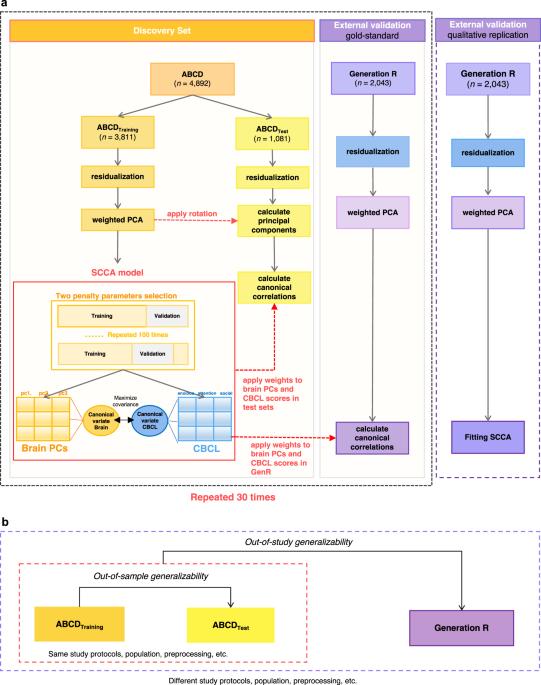Limited generalizability of multivariate brain-based dimensions of child psychiatric symptoms
引用次数: 0
Abstract
Multivariate machine learning techniques are a promising set of tools for identifying complex brain-behavior associations. However, failure to replicate results from these methods across samples has hampered their clinical relevance. Here we aimed to delineate dimensions of brain functional connectivity that are associated with child psychiatric symptoms in two large and independent cohorts: the Adolescent Brain Cognitive Development (ABCD) Study and the Generation R Study (total n = 6935). Using sparse canonical correlations analysis, we identified two brain-behavior dimensions in ABCD: attention problems and aggression/rule-breaking behaviors. Importantly, out-of-sample generalizability of these dimensions was consistently observed in ABCD, suggesting robust multivariate brain-behavior associations. Despite this, out-of-study generalizability in Generation R was limited. These results highlight that the degrees of generalizability can vary depending on the external validation methods employed as well as the datasets used, emphasizing that biomarkers will remain elusive until models generalize better in true external settings. Reliability of biomarkers is key to their relevance. Out-of-sample generalizability of brain-behavior associations in attention problems and aggression/rule-breaking within the ABCD dataset is high, but generalization to Generation R Study data is limited.

以大脑为基础的儿童精神症状多元维度的推广性有限
多变量机器学习技术是一套很有前途的工具,可用于识别复杂的大脑行为关联。然而,由于这些方法无法在不同样本间复制结果,因此影响了它们的临床相关性。在这里,我们的目标是在两个独立的大型队列:青少年大脑认知发展(ABCD)研究和R世代研究(总人数=6935)中,找出与儿童精神症状相关的大脑功能连接维度。通过稀疏典型相关分析,我们在 ABCD 研究中发现了两个大脑行为维度:注意力问题和攻击/破坏规则行为。重要的是,在ABCD中持续观察到了这些维度的样本外普遍性,这表明多变量大脑行为关联性很强。尽管如此,R 代的样本外普遍性仍然有限。这些结果突出表明,可推广性的程度可能因所采用的外部验证方法和所使用的数据集而异,这强调了在模型在真正的外部环境中具有更好的推广性之前,生物标志物仍将是难以捉摸的。生物标志物的可靠性是其相关性的关键。在 ABCD 数据集中,注意力问题和攻击/破坏规则方面的大脑行为关联的样本外概括性很高,但对 R 世代研究数据的概括性有限。
本文章由计算机程序翻译,如有差异,请以英文原文为准。
求助全文
约1分钟内获得全文
求助全文

 求助内容:
求助内容: 应助结果提醒方式:
应助结果提醒方式:


